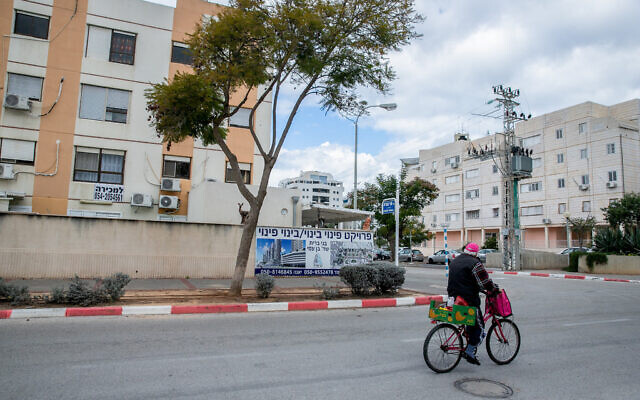How to make urban renewal smoother: Keep developers and homeowners on the same side
Government office hopes to streamline process of rebuilding by requiring a consultant for each project, who will keep confused or disenchanted homeowners informed and involved

Israel’s urban renewal authorities are looking to streamline a flagship project that has been effective at developing some areas but is also notorious for its complexity.
Urban renewal via the evacuate-and-rebuild program known as Pinui Binui has been a feature of Israel’s real estate landscape for around two decades. But a typical project, according to Times of Israel research, can take 12 years from start to finish.
The Government Authority for Urban Renewal — a dedicated office under the purview of the Construction and Housing Ministry — has put out a new guide meant to address one of the major stumbling blocks in the program: keeping apartment owners in a Pinui Binui building involved and engaged through a long, often arduous process.
Pinui Binui involves increasing the volume of housing in a space that is already built up. Existing buildings are demolished and replaced with taller, modern buildings with more apartments, built to a higher standard, with more facilities. Existing apartment owners need to agree to the project, and often need to relocate while work is underway, with the rental cost of their temporary homes paid by the developer. In return, they receive a larger apartment in the new, rebuilt building.
Earlier this year, as reported by The Times of Israel, changes were made to the program to increase development incentives — allowing larger increases in the numbers of new apartments (400% and more), and requiring public space as part of new projects.
The new guide from the urban renewal authority focuses on engaging homeowners through the decision-making process. It includes proposing mediation as a way of shortening the planning process, and providing guidance and relevant information to those affected by a given project. It also calls for more involved participation by homeowners in the decision-making process so as to avoid later objections that lead to significant delays.
Each project’s developer will be responsible for appointing a consultant who can take responsibility for proper public engagement and work closely with residents’ representatives.
“It’s clear there’s a need for guidance in this area,” Elazar Bamberger, director general of the authority. “Proper engagement between the developer and apartment owners has been proven to greatly improve the chances of success of Pinui Binui projects.
“The guide is the result of experience built up through many projects. It… makes the main steps required by the developer vis-à-vis the tenants clear and simple, for the benefit of all partners in the life of the project,” he added.









